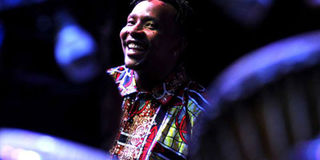Idd Aziz: Our sound is cherished world over

He hopes Kenyan music can go back to the days it was the reference point in Africa by fusing the old and the new. PHOTO | FILE
What you need to know:
- His quest is to bring back the elements that made the African sound originally enticing to the ear, and fuse them with modern instrumentations.
- His father sent him to Rabai at around the age of five, when his parents noted that he had taken a liking to music.
- They believed the only way for him to develop his skills well was by being in the traditional set-up of the coastal culture that is rich in musical instrumentation, composition and vocals.
Idd Aziz was nurtured in traditional music from a very young age. A musician and multi-instrumentalist, his has been a quest to bring back the elements that made the African sound originally enticing to the ear, and fuse them with modern instrumentations.
His first album “Afrikala”, was an Afro-House creation of Rabai and house music.
TALENT
Mr Aziz plays the kalimba, and traditional and modern drums. The Nairobi-born musician was sent to Rabai by his father at around the age of five, when his parents noted that he had taken a liking to music. He would hit cans to mimic drumming but claims he could actually hold a rhythm even then.
They believed the only way for him to develop his skills well was by being in the traditional set-up of the coastal culture that is rich in musical instrumentation, composition and vocals. While he was in the village, he was able to accompany medicine people to perform at healing ceremonies and also other traditional festivities.
He was able to go for school drama festivals, making it all the way to the nationals with his older brother while in Standard Seven at Mwangutwa Primary School. When he came back to Nairobi for high school, he continued playing drums, while at the same time making and selling kivotis (flute), kayambas and traditional drums to music shops in the city.
“The old music shops’ owners all know me. My dad had taught me the craft and I was able to get pocket money from this,” says Aziz.
MUSIC AND THEATRE
After high school he joined Utamaduni Crafts and Conservations’ Utamaduni Dancers in 1995, before going off to join Shade Hotel’s in-house band. He then started visiting the Kenya National Theatre and eventually joined African Tumba band.
In 1999, he formed a musical called Radi, which he toured with internationally. At this time he also got to work with Necessary Noize, Iddi Achieng’, the late Achieng’ Abura, Mercy Myrah and many other artistes as a percussionist or background vocalist at Tedd Josiah’s Blu Zebra Records.
Working on these artistes’ albums sparked his interest in song composition and he started composing songs — his own songs. In 2003 he moved to Europe.
“I had worked with many anthropologists regarding matters around traditional music, rhythm and culture. I had been to numerous workshops and seminars with jazz (including one with the late Hugh Masekela) and traditional musicians from all over Africa, gaining vast knowledge of the intricacies in African music.
“I had also done acting and scoring workshops and travelled from 1998 to 2001 with a German theatre project called “Instant Act” to Germany, Russia, Holland and Switzerland. It was to sensitise matters on racism. We visited schools, prisons and youth centres showing how people could live together without considering what race or where one comes from.
“The anthropologists then recommended me to the Norwegian University of Science and Technology’s Trondheim Conservatory of Music.”
AFRICAN RHYTHM
Here he would teach African Rhythm as part of the courses required for the music degree programme. He had a class every day of the semester, which included teaching the students how to make different African musical instruments. He travelled across Europe with some of his classes as they played his music and some of their own compositions a well as working with other professors to create orchestral scores.
He won awards with these groups across Europe. While there, Aziz also got the opportunity to work with Angelic Kidjo, Salif Keita, Alpha Blondy and Youssou N’Dour.
UNIQUE SOUND
In 2015, he decided to come back. “I wanted to improve Kenyan music by helping to work towards a unique sound. Abroad, they really appreciate the traditional African sound and the modern sounds we are creating.
“Lots of artistes here are town-bred and don’t know about the indigenous rhythms and song composition. Most are in music for quick fame or money and not the art. That’s why the songs don’t have longevity,” says Aziz.
He has observed that Kenyans now understand music that they would only listen to on radio, and which ones they would pay to listen to at concerts and festivals which are similar to those appreciated on the international stages.
He hopes Kenyan music can go back to the days it was the reference point in Africa, saying Nigerians got it right the moment they incorporated their traditional sound in their music.
Since his return, Aziz has released numerous songs including “Kiswahili Vale” and the latest one “Milele”. In May, he will embark on a performance tour of Ethiopia, UK, Senegal, Norway, Sweden and Denmark.





